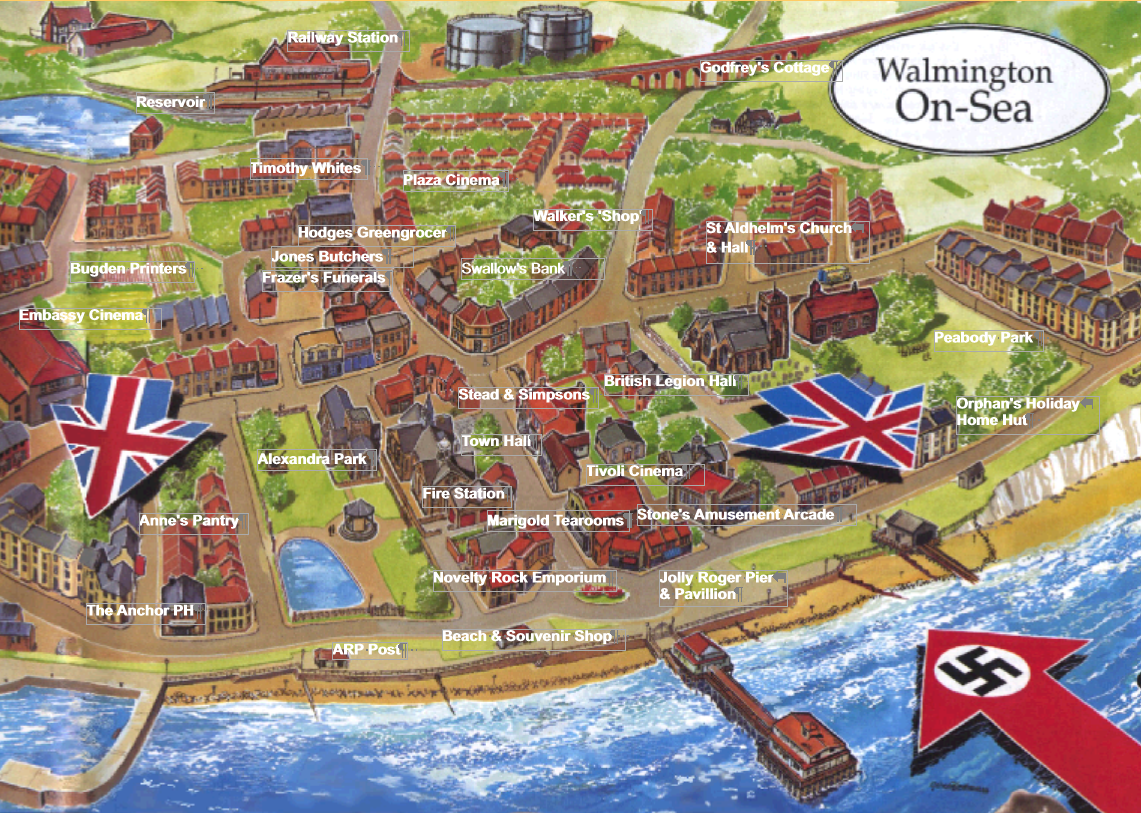


Pre War
The book "Dad's Army, The Defence of a Front Line English Village", describes Walmington-on-Sea as being situated in Sussex, but there is undisputed evidence to disprove this. The town's Police Station is seen to be under the jurisdiction of Kent Constabulary and, from the pens of the authors themselves, "Walmington-on-Sea, set on that strip of Kent coast which endured so much". The town was a popular seaside resort, with a High Street lined with shops, which supplied the inhabitants and visitors with life's essentials and some of its luxuries.
Although not a fashionable resort, the town was host to a great number of holiday-makers, who mainly stayed in guest houses, of which there were many, catering for all tastes. In common with the best holiday venues, the town had a bandstand on the promenade and a pier, popular with fishermen. On sunny days Mr Bluett, the local photographer, could be seen with his camera on the promenade photographing the visitors as they strolled along, enjoying the sea air. He would supply a photograph of their holiday memory for ten bob which wouldn't faded for at least a week after they got back home! The sandy beach was much in favour with the children, as was Stone's Amusement Arcade and the boating lake. A visit to the Novelty Rock Emporium was a special treat for them, to buy mint rock and giant humbugs.
There were many streets lined with small houses and bungalows, a large number of which accommodated people who could afford to retire to the town to enjoy their declining years in pleasant surroundings by the sea. Sunday services held at the old parish church of St Aldhelm's in Mortimer Road were well attended, the congregation being augmented during the summer months by the more devout of the holiday-makers. The Marigold Tea-rooms, ably managed by Miss Fortescue, where the customers were entertained by Miss Rowland's Trio, provided light refreshments for the visitors, as did Ann's Pantry, well known locally for its Devonshire teas, and the Dutch Oven, further along the High Street. Refreshment of a stronger brew was readily available from the town's numerous public houses, The Dog and Partridge, The Red Lion and the Horse and Groom, to name but a few. The fish and chip shop and restaurant, situated for aesthetic reasons in a back street, was well patronised by both locals and visitors. Evening entertainment was provided by the resident summer concert party in the pier pavilion and the town's one cinema. Walmington-on-Sea was, in effect, during the years between the two World Wars, a typical small thriving English seaside town, its economy relying on visitors and day-trippers.
Wartime
Wartime Walmington presents a very different aspect. The beach is now inaccessible, protected by rolls of barbed wire, concrete pill-boxes, mines and anti-tank blocks, the well used deck chairs and boating pool leisure craft now in store. The neat iron railings and gates in front of the houses and bungalows have been removed to help with the war effort and most householders have installed Anderson air-raid shelters in their back gardens and placed brown tape on their windows. Many of these back gardens have been given over to the production of vegetables, as a result of the Government's "Dig For Victory" campaign. Stone's Amusement Arcade and the Novelty Rock Emporium are closed, now put to good use by the local Home Guard platoon as strong-points, protecting the town's inhabitants from the tramp of Nazi jackboots. The Jolly Roger Ice Cream Parlour now serves as an Air-raid Wardens' Post, where one may often see, and hear, Mr Hodges the Chief Warden, one of whose duties it is to ensure that no-one contravenes the black-out regulations, a duty which he takes extremely seriously. However, his officious and bullying manner in carrying out his mission to protect the town does tend to make him rather unpopular.
The bandstand on the promenade, erected to commemorate Queen Victoria's visit to the town in 1891, survives despite an urgent request for its demolition from the local Home Guard commander, but is now derelict and rusting. The coloured lights which had previously illuminated the length of the promenade have been taken down and the pier is closed for the duration, the sea-ward end being used by the Royal Navy as a machine gun post. Regarding the pier, despite what has been said, the centre section has not been deliberately removed to deprive invading German forces of a landing stage, as has been done to so many piers along the south coast. The truth is, a Royal Navy corvette, steaming through Walmington Bay during a thick fog, collided with it and the damaged section was eventually removed. Harris's Holiday Home Hut, which for many years had given so much pleasure to numerous orphan children, is barred and shuttered and the town's cinema is closed, film-goers now obliged to make the ten mile bus journey to the nearest one in Eastgate. However, most of the shops in the High Street remain open for business, amongst which can be seen Jones' butchers shop, Swann's grocery store, Drury's the undertakes, Sedgewick's shoe shop, Timothy Whites, Elliott's Radio store, Stead and Simpson, Hodges' greengrocer and fruiterer and Frazer's philatelic shop, although this will soon close due to lack of customers now that there are no visitors to the town, the proprietor turning his attention to directing funerals. The tea-rooms are all open, doing their best to provide refreshment, albeit with much reduced menus, the Marigold Tea Room now without its musical entertainment. Nourishing although usually mundane meals are available for a modest sum at the town's British Restaurant; however, eating here does help to make the food ration go a little further at home. For the same reason the fish and chip shop is as popular as ever, with a regular supply of locally caught fish.
The local branch of Swallow's Bank still occupies its corner site in the High Street, despite some bomb damage, ably managed by Mr. Mainwaring, always willing to advise his clients on investments and to arrange loans for the less fortunate. Also in the High Street is the surgery of Dr. McCeavedy, the well respected GP, who has dealt with the maladies of the townsfolk for many years, now ready to treat the injured should the worst happen. Walmington-on-Sea Cottage Hospital, on the outskirts of the town, is also well prepared to deal with casualties if the Luftwaffe should decide to turn its attention on the community.
In the square stands the Town Hall, where the Mayor may frequently be seen entering the imposing doorway, now well protected with sandbags, on his way to consult with Mr. Claude Gordon, the Town Clerk. The Town Hall clock, at one time an attractive feature with its moving lifelike figures, no longer chimes out the hours, having stopped at ten past three. Its repair is at present delayed due to lack of labour and materials.
The present incumbent of St Aldhelm's church is the Reverend Timothy Farthing, assisted by his lugubrious verger, Maurice Yeatman, who is also skipper of the Walmington Sea Scouts and their bugle band. The verger's wife, Beryl, trains the local girl's netball team. The vicar is constantly concerned by the lack of parishioners attending his services, as many families have deserted the town, the young men are serving in the armed forces and there are no longer any visitors to swell the congregation. Now only a handful of the faithful take the trouble to listen to his sermons. As a keen campanologist the war has dealt him another cruel blow, all but one of his church bells having been taken away to be melted down for the war effort, even the remaining one can only be tolled as an invasion warning. His church hall, however, is an entirely different matter, being much in demand by the local Home Guard platoon, the Air-raid Wardens and the Sea Scouts. In fact, he has little opportunity to make use of his office in the hall, much to his annoyance. The town's public houses remain open, but with considerably restricted hours because of their much reduced allocation of been and spirits, all too often running out of the former and the latter is almost unobtainable unless one is prepared to buy on the black-market at highly inflated prices. This inconvenience, the blackout, queuing and food rationing are the most frequently heard complaints from the townsfolk.
But, despite the war with its constant threat of air-raids and German invasion, Walmington-on-Sea is carrying on as normally as possible on the home front. A few high-explosive and incendiary bombs have already been dropped on the town, either by accident or design, causing some damage to buildings but no loss of life. Its inhabitants are steadfastly determined not to allow the hardships and shortages to affect their morale.
(Copyright DAAS. Acknowledgements to Messrs. Perty and Croft, Mr. J. Burke, Mr. P. Ableman and the BBC)